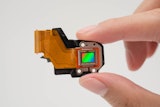Chapter.01/07
What is Digital Health?
Can you imagine going your whole life without feeling pain, fear or anxiety—even during childbirth? For a 71-year-old woman in Scotland, that’s reality.
But what does her experience have to do with digital health? Everything, potentially. Researchers analyzing the woman’s DNA recently discovered a mutation in a previously unidentified gene that caused the gene to lack its front portion—and the woman to lack the experience of pain.

Now scientists are trying to decipher what that gene could mean for society at large. Their goal: to create more effective pain therapies by targeting the gene they discovered. Findings like this offer great potential as we collectively try to address the opioid epidemic, which has left millions of Americans addicted to prescription painkillers.
That discovery and anything it leads to wouldn’t have been possible, though, without the powerful advances of digital health—the convergence of the digital revolution with health care. This trend holds immense potential, and we’re only just beginning to understand how those separate domains might affect one another.
The challenges and ideas these students go on to pursue could lead to major advances in many fields—perhaps most dramatically in health care.
Because they’re not so separate after all. Technology and society have grown so intertwined that major universities—with funding from heavy hitters in the tech industry and charitable foundations—are collaborating to foster a new generation of civic-minded technologists. One such group, called the Public Interest Technology University Network, comprises 21 universities, among them Arizona State University, Howard University and the University of Chicago. These schools are teaching courses that help future technologists think about the social and ethical implications of their work and that provide technological training to students interested in fields including health care, law and government. The challenges and ideas these students go on to pursue could lead to major advances in many fields—perhaps most dramatically in health care.

The Future of Health Is Digital
Health care innovators are already making far-reaching changes to the industry.
Health care innovators are already making far-reaching changes to the industry, but right now they’re the exception more than the rule. Consider this story of a 2011 flight from Washington, D.C., to California: 30 minutes into the transcontinental trip, an urgent announcement boomed over the PA system to ask, “Is there a doctor on board?” The request sounded as if it had come straight from a Hollywood movie, but a passenger on the plane was in very real distress, sweating and gripping his chest in pain.
The passenger was scared, but he was also in luck. Eric Topol, a physician scientist with Scripps Research, was on board that day. And Topol isn’t just any physician; he’s an inventor who happened to have with him a prototype device for a mobile echocardiogram, which he had just demonstrated at a conference at the National Institutes of Health.
Moving quickly, Topol unbuttoned the passenger’s shirt and placed the device’s two metal sensors onto the passenger’s chest. They recorded the pulsating electrical current that the patient’s palpitating heart generated. The resulting data would reveal whether the man was experiencing something manageable, such as acid reflux, or a life-threatening emergency.
Within seconds, data from the electrodes passed wirelessly to an app on Topol’s phone.
Within seconds, data from the electrodes passed wirelessly to an app on Topol’s phone, revealing exactly what everyone feared: the passenger was in the middle of an acute heart attack. The pilot needed to land the plane so emergency responders could get the passenger into surgery.
Digital health advances such as this one have huge potential to save lives and revolutionize health care.
Digital health advances such as this one have huge potential to save lives and revolutionize health care. Just as digital technology has enabled humans to expand our knowledge, extend our communications and project ourselves into space, it has also enabled us to see more deeply inside the body than ever before. When we bring digital technology to health care, that means big changes for our approach to medicine.
Medicine, Personalized

Global Market Insights reports that the health systems technology business is estimated to reach $156.9 billion by 2025.
Digital health has become a market sector in its own right. Global Market Insights reports that the health systems technology business is estimated to reach $156.9 billion by 2025, nearly a 30% increase over 2018. The digital health field is a space for innovators to tailor revolutionary technological tools to the medical field: algorithms, big data, nanotech, mobile access, sensor technologies, cloud computing, genomics … the list will only grow with time.
For example, precision medicine—also known as personalized medicine or individualized medicine—involves matching treatments to an individual’s genes, environment and lifestyle. But that specification wouldn’t be possible without the technology that enables researchers to analyze our genetic makeup.

Physicians can now treat leukemia patients based on their genetics instead of a one-size-fits-all approach.
In cancer, this approach was first used with leukemia patients. Thanks to a series of discoveries in the 1960s and ’70s that culminated in the development of a drug in 2001, physicians can now treat leukemia patients based on their genetics instead of a one-size-fits-all approach. And as technology enables scientists to see even further into the human genome, that same drug has been used to successfully treat other cancers as well. It has also become standard for breast cancer patients to undergo treatment specific to their genetic type of breast cancer (double positive or triple negative, for example). Whether it’s chemotherapy or medications, what a doctor prescribes depends on the patient’s cells.
And while cancer affects millions of people (1.7 million are diagnosed with cancer each year), millions more have direct experience with mobile health, which refers to the use of smartphones, fitness trackers and other wireless technology in medical care. From FitBits to telemedicine, that’s the mobile version of digital health.
Health on the Go
Telemedicine does everything from speeding up emergency room wait times by enabling physicians to consult with patients remotely, to increasing health care access for people who live in areas with few health facilities or health care providers.
Correct!
Incorrect
The Future of Digital HealthHundreds of thousands of mobile health apps are currently available for download in app stores.
And then there are the trackers. Hundreds of thousands of mobile health apps are currently available for download in app stores. You can track your steps, your sleep, your menstrual cycle, your glucose levels and your blood pressure, just to name a few of the many biometrics a mobile device can track. The information collected by these devices not only informs medical decisions but also motivates people to stay healthy. Step count low for the day? Take a walk around the park. Glucose level too high? If the pattern keeps up, you may need to change your medications or diet.
Digital Health Revolution

Digital health is all of these things—and so much more. It harnesses the power of technology to improve the human condition in ways that past generations could never have imagined.
Who has access to all the data our apps are collecting and our medical providers are storing?
As exciting as that is, there remains the sobering reality of skyrocketing health care costs. The United States spends more than any other country—$3.5 trillion a year—on health care, but with outcomes that lag behind other developed countries. There’s also the potential cybersecurity dark side to consider: Who has access to all the data our apps are collecting and our medical providers are storing?

In order to create a health care model that matches our technological capabilities, medicine needs to become smarter. It needs to use advances in technology to prevent, detect and treat diseases before they grow beyond our control; place the power of health care more squarely in the hands of the consumer; grant greater health care access to everyone; and keep all of our information secure.
Bring on the era of digital health.
Next Section
The History of Digital Health
Chapter 02 of 07
Learn how medicine and technology have evolved throughout history.
